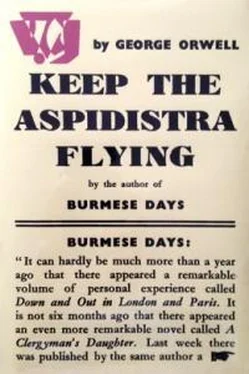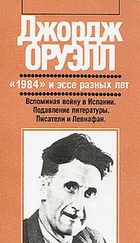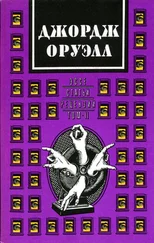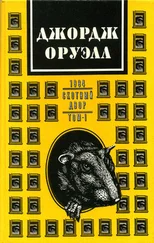Yet in a way it was not so easy. One night about nine he was lying on his bed, with the ragged counterpane over his feet, his hands under his head to keep them warm. The fire was out. The dust was thick on everything. The aspidistra had died a week ago and was withering upright in its pot. He slid a shoeless foot from under the counterpane, held it up, and looked at it. His sock was full of holes—there were more holes than sock. So here he lay, Gordon Comstock, in a slum attic on a ragged bed, with his feet sticking out of his socks, with one and fourpence in the world, with three decades behind him and nothing, nothing accomplished! Surely NOW he was past redemption? Surely, try as they would, they couldn't prise him out of a hole like this? He had wanted to reach the mud— well, this was the mud, wasn't it?
Yet he knew that it was not so. That other world, the world of money and success, is always so strangely near. You don't escape it merely by taking refuge in dirt and misery. He had been frightened as well as angry when Rosemary told him about Mr Erskine's offer. It brought the danger so close to him. A letter, a telephone message, and from this squalor he could step straight back into the money–world—back to four quid a week, back to effort and decency and slavery. Going to the devil isn't so easy as it sounds. Sometimes your salvation hunts you down like the Hound of Heaven.
For a while he lay in an almost mindless state, gazing at the ceiling. The utter futility of just lying there, dirty and cold, comforted him a little. But presently he was roused by a light tap at the door. He did not stir. It was Mother Meakin, presumably, though it did not sound like her knock.
'Come in,' he said.
The door opened. It was Rosemary.
She stepped in, and then stopped as the dusty sweetish smell of the room caught her. Even in the bad light of the lamp she could see the state of filth the room was in—the litter of food and papers on the table, the grate full of cold ashes, the foul crocks in the fender, the dead aspidistra. As she came slowly towards the bed she pulled her hat off and threw it on to the chair.
'WHAT a place for you to live in!' she said.
'So you've come back?' he said.
'Yes.'
He turned a little away from her, his arm over his face. 'Come back to lecture me some more, I suppose?'
'No.'
'Then why?'
'Because—'
She had knelt down beside the bed. She pulled his arm away, put her face forward to kiss him, then drew back, surprised, and began to stroke the hair over his temple with the tips of her fingers.
'Oh, Gordon!'
'What?'
'You've got grey in your hair!'
'Have I? Where?'
'Here—over the temple. There's quite a little patch of it. It must have happened all of a sudden.'
'"My golden locks time hath to silver turned,"' he said indifferently.
'So we're both going grey,' she said.
She bent her head to show him the three white hairs on her crown. Then she wriggled herself on to the bed beside him, put an arm under him, pulled him towards her, covered his face with kisses. He let her do it. He did not want this to happen—it was the very thing that he least wanted. But she had wriggled herself beneath him; they were breast to breast. Her body seemed to melt into his. By the expression of her face he knew what had brought her here. After all, she was virgin. She did not know what she was doing. It was magnanimity, pure magnanimity, that moved her. His wretchedness had drawn her back to him. Simply because he was penniless and a failure she had got to yield to him, even if it was only once.
'I had to come back,' she said.
'Why?'
'I couldn't bear to think of you here alone. It seemed so awful, leaving you like that.'
'You did quite right to leave me. You'd much better not have come back. You know we can't ever get married.'
'I don't care. That isn't how one behaves to people one loves. I don't care whether you marry me or not. I love you.'
'This isn't wise,' he said.
'I don't care. I wish I'd done it years ago.'
'We'd much better not.'
'Yes.'
'No.'
'Yes!'
After all, she was too much for him. He had wanted her so long, and he could not stop to weigh the consequences. So it was done at last, without much pleasure, on Mother Meakin's dingy bed. Presently Rosemary got up and rearranged her clothes. The room, though stuffy, was dreadfully cold. They were both shivering a little. She pulled the coverlet further over Gordon. He lay without stirring, his back turned to her, his face hidden against his arm. She knelt down beside the bed, took his other hand, and laid it for a moment against her cheek. He scarcely noticed her. Then she shut the door quietly behind her and tiptoed down the bare, evil–smelling stairs. She felt dismayed, disappointed, and very cold.
Spring, spring! Bytuene Mershe ant Averil, when spray biginneth to spring! When shaws be sheene and swards full fayre, and leaves both large and longe! When the hounds of spring are on winter's traces, in the spring time, the only pretty ring time, when the birds do sing, hey–ding–a–ding ding, cuckoo, jug–jug, pu–wee, ta– witta–woo! And so on and so on and so on. See almost any poet between the Bronze Age and 1805.
But how absurd that even now, in the era of central heating and tinned peaches, a thousand so–called poets are still writing in the same strain! For what difference does spring or winter or any other time of year make to the average civilized person nowadays? In a town like London the most striking seasonal change, apart from the mere change of temperature, is in the things you see lying about on the pavement. In late winter it is mainly cabbage leaves. In July you tread on cherry stones, in November on burnt–out fireworks. Towards Christmas the orange peel grows thicker. It was a different matter in the Middle Ages. There was some sense in writing poems about spring when spring meant fresh meat and green vegetables after months of frowsting in some windowless hut on a diet of salt fish and mouldy bread.
If it was spring Gordon failed to notice it. March in Lambeth did not remind you of Persephone. The days grew longer, there were vile dusty winds and sometimes in the sky patches of harsh blue appeared. Probably there were a few sooty buds on the trees if you cared to look for them. The aspidistra, it turned out, had not died after all; the withered leaves had dropped off it, but it was putting forth a couple of dull green shoots near its base.
Gordon had been three months at the library now. The stupid slovenly routine did not irk him. The library had swelled to a thousand 'assorted titles' and was bringing Mr Cheeseman a pound a week clear profit, so Mr Cheeseman was happy after his fashion. He was, nevertheless, nurturing a secret grudge against Gordon. Gordon had been sold to him, so to speak, as a drunkard. He had expected Gordon to get drunk and miss a day's work at least once, thus giving a sufficient pretext for docking his wages; but Gordon had failed to get drunk. Queerly enough, he had no impulse to drink nowadays. He would have gone without beer even if he could have afforded it. Tea seemed a better poison. All his desires and discontents had dwindled. He was better off on thirty bob a week than he had been previously on two pounds. The thirty bob covered, without too much stretching, his rent, cigarettes, a washing bill of about a shilling a week, a little fuel, and his meals, which consisted almost entirely of bacon, bread–and–marg, and tea, and cost about two bob a day, gas included. Sometimes he even had sixpence over for a seat at a cheap but lousy picture–house near the Westminster Bridge Road. He still carried the grimy manuscript of London Pleasures to and fro in his pocket, but it was from mere force of habit; he had dropped even the pretence of working. All his evenings were spent in the same way. There in the remote frowzy attic, by the fire if there was any coal left, in bed if there wasn't, with teapot and cigarettes handy, reading, always reading. He read nothing nowadays except twopenny weekly papers. Tit Bits, Answers, Peg's Paper, The Gem, The Magnet, Home Notes, The Girl's Own Paper—they were all the same. He used to get them a dozen at a time from the shop. Mr Cheeseman had great dusty stacks of them, left over from his uncle's day and used for wrapping paper. Some of them were as much as twenty years old.
Читать дальше








